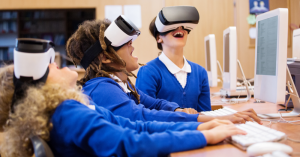
Imagine dissecting a frog in biology class without the nauseating smell of embalmed amphibian flesh or the risk of accidentally cutting your finger. Picture yourself mixing active compounds in chemistry class and learning from your mistakes without shattering any glass or causing chemical reactions that overflow their beakers. You’re wearing different goggles in this lab.
Leaping from the pages and screens of science fiction into our reality, a technology that feels at once familiar and perhaps even disappointing is poised to transform education in some remarkable ways, with new classroom products gaining traction in schools.
Better Late Than Never: VR’s Overdue Arrival in the Classroom
Virtual reality (VR) is an exciting technology that has captivated imaginations for decades without living up to its billing as a transformative learning tool of the future. VR refers to computer-generated environments that people can explore and interact with using an audiovisual headset that creates the illusion of being within a digital space.
Today, VR is finally showing signs of reaching technological maturity in several sectors beyond entertainment. With long-awaited breakthroughs in hardware and software, virtual-reality tools are now revolutionizing learning and collaboration at the leading edge of high-tech professions, from immersive combat training and psychotherapy sessions to architecture design and practice surgeries.
The classroom is no different. You don’t have to be an astronaut to learn safely in VR. Especially since the coronavirus pandemic overtook the world, society has struggled to find innovative ways to teach the next generation of lifelong learners safely.
Perhaps VR is the next wave of education technology (EdTech) at all levels, from K-12 to higher education and beyond to specialized professions like jet piloting and practices like dentistry. It’s no longer implausible to predict that entirely new disciplines and industries will emerge based in VR in the near future.
In the education sector, from kindergarten to Ph.D. programs, the presence of VR is growing. As a relatively new audiovisual medium for connecting and sharing knowledge, VR has great potential for classroom instruction and experiential learning.
Are you looking for more information about classroom VR? Keep reading for everything you need to know!
Contact your dedicated Account Manager:
Sarah Goncalves 
Regional Vice President of Sales
888-226-5727 x3730
Sarah.Goncalves@bluum.com
